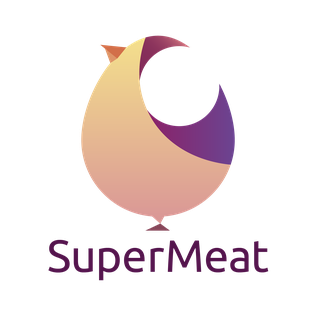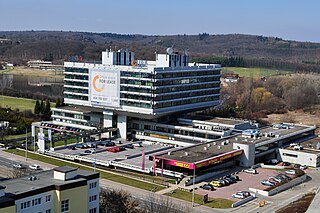
A meat alternative or meat substitute, is a food product made from vegetarian or vegan ingredients, eaten as a replacement for meat. Meat alternatives typically approximate qualities of specific types of meat, such as mouthfeel, flavor, appearance, or chemical characteristics. Plant- and fungus-based substitutes are frequently made with soy, but may also be made from wheat gluten as in seitan, pea protein as in the Beyond Burger, or mycoprotein as in Quorn. Alternative protein foods can also be made by precision fermentation, where single cell organisms such as yeast produce specific proteins using a carbon source; as well as cultivated or laboratory grown, based on tissue engineering techniques.

[[

Tyson Foods, Inc. is an American multinational corporation based in Springdale, Arkansas that operates in the food industry. The company is the world's second-largest processor and marketer of chicken, beef, and pork after JBS S.A. It annually exports the largest percentage of beef out of the United States. Together with its subsidiaries, it operates major food brands, including Jimmy Dean, Hillshire Farm, Ball Park, Wright Brand, Aidells, and State Fair. Tyson Foods ranked No. 79 in the 2020 Fortune 500 list of the largest United States corporations by total revenue.
New Harvest is a donor-funded research institute dedicated to the field of cellular agriculture, focusing on advances in scientific research efforts surrounding cultured animal products. Its research aims to resolve growing environmental and ethical concerns associated with industrial livestock production.

Josh Balk is an American activist, currently serving as CEO of The Accountability Board, which he co-founded. Previously, he was vice president of farm animal protection for tbe Humane Society of the United States (HSUS) farm animal division. In addition, he is a cofounder of Eat Just, a food technology company. Prior to working with HSUS and founding Eat Just, he was known for his work at Animal Outlook. Balk is best known for leading successful legislative campaigns for farm animals, along with his work with food companies in enacting animal welfare policies that include eliminating gestation crates for breeding pigs and battery cages for chickens. He is also known for his work with the food industry to shift its focus onto plant-based foods.
Eat Just, Inc. is a private company headquartered in San Francisco, California, US. It develops and markets plant-based alternatives to conventionally produced egg products, as well as cultivated meat products. Eat Just was founded in 2011 by Josh Tetrick and Josh Balk. It raised about $120 million in early venture capital and became a unicorn in 2016 by surpassing a $1 billion valuation. It has been involved in several highly publicized disputes with traditional egg industry interests. In December 2020, its cultivated chicken meat became the first cultured meat to receive regulatory approval in Singapore. Shortly thereafter, Eat Just's cultured meat was sold to diners at the Singapore restaurant 1880, making it the "world's first commercial sale of cell-cultured meat".

Beyond Meat, Inc. is a Los Angeles–based producer of plant-based meat substitutes founded in 2009 by Ethan Brown. The company's initial products were launched in the United States in 2012. The company went public in 2019, becoming the first plant-based meat analogue company to go public.

Upside Foods is a food technology company headquartered in Berkeley, California, aiming to grow sustainable cultured meat. The company was founded in 2015 by Uma Valeti (CEO), Nicholas Genovese (CSO), and Will Clem. Valeti was a cardiologist and a professor at the University of Minnesota.
This page is a timeline of major events in the history of cellular agriculture. Cellular agriculture refers to the development of agricultural products - especially animal products - from cell cultures rather than the bodies of living organisms. This includes in vitro or cultured meat, as well as cultured dairy, eggs, leather, gelatin, and silk. In recent years a number of cellular animal agriculture companies and non-profits have emerged due to technological advances and increasing concern over the animal welfare and rights, environmental, and public health problems associated with conventional animal agriculture.

SuperMeat is an Israeli startup company working to develop a "meal-ready" chicken cultured meat product created through the use of cell culture.
Cellular agriculture focuses on the production of agricultural products from cell cultures using a combination of biotechnology, tissue engineering, molecular biology, and synthetic biology to create and design new methods of producing proteins, fats, and tissues that would otherwise come from traditional agriculture. Most of the industry is focused on animal products such as meat, milk, and eggs, produced in cell culture rather than raising and slaughtering farmed livestock which is associated with substantial global problems of detrimental environmental impacts, animal welfare, food security and human health. Cellular agriculture is a field of the biobased economy. The most well known cellular agriculture concept is cultured meat.

Marcus Johannes "Mark" Post is a Dutch pharmacologist who is Professor of Vascular Physiology at Maastricht University and Professor of Angiogenesis in Tissue Engineering at the Eindhoven University of Technology. On 5 August 2013, he was the first in the world to present a proof of concept for cultured meat. In 2020, he was listed by Prospect as the ninth-greatest thinker for the COVID-19 era.

Mosa Meat is a Dutch food technology company, headquartered in Maastricht, Netherlands, creating production methods for cultured meat. It was founded in May 2016.

Cellular Agriculture Society is a lobby organization. It is an international 501(c)(3) organization based in Miami, created in 2017 to research, fund and advance cellular agriculture.

Finless Foods, or Finless for short, is an American biotechnology company aimed at cultured fish, particularly bluefin tuna.
Aleph Farms is a cellular agriculture company active in the food technology space. It was co-founded in 2017 by the Israeli food-tech incubator "The Kitchen Hub" of Strauss Group Ltd., and Prof. Shulamit Levenberg of the Faculty of Biomedical Engineering at Technion – Israel Institute of Technology and is headquartered in Rehovot, Israel.

BioTech Foods is a Spanish biotechnology company dedicated to the development of cultured meat from the cultivation of muscle cells previously extracted from animals. It is a subsidiary of Brazilian company JBS S.A.

Believer Meats, from 2018 to 2022 known as Future Meat Technologies, or Future Meat for short, is a biotechnology firm which produces cultured meat from chicken cells and is working on cultured lamb kebabs and beef burgers. Based in Israel, its main office is located in Jerusalem, while its primary production facility is operating in Rehovot. Future Meat Technologies mainly seeks to supply hardware and cell lines to manufacturers of cultured meat rather than directly selling food products to consumers. In November 2022, Future Meat Technologies rebranded to Believer Meats.

Wildtype is an American seafood company that produces cultivated seafood from fish cells. Its headquarters is located in the Dogpatch neighborhood of San Francisco, California and includes a former microbrewery that has been converted into Wildtype's first Fishery where their cultivated seafood is produced. Wildtype's first product is cultivated Pacific salmon that will offer several benefits when compared to conventionally-harvested fish.

Bene Meat Technologies a.s. (BMT) is a Czech biotechnology start-up focused on research and development of technology for the production of cultivated meat on an industrial scale. It cooperates with scientific institutions and companies in the Czech Republic and abroad. The company has its laboratories on the first floor of the Cube building in Vokovice, Prague.















